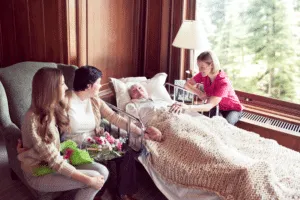As a loved one approaches the end of their life, their family may want to bring on a helping hand to guide them through this difficult and emotional time. This is where an end-of-life doula comes in.
Some people may regard doulas as birth coaches or birth doulas, but they also help individuals transition through death. Doulas are compassionate professionals who provide emotional, physical, and spiritual support to individuals and their families during significant transitions like birth or death.In this article, we'll explore what end-of-life doulas are, what they do, the difference between doula and hospice care, and how to become an end-of-life doula.

What Is an End-of-Life Doula?
An end-of-life doula is a trained professional who provides non-medical support and additional support to individuals, their families, and to the hospice team during the last phase of a person's life. These lovely individuals offer emotional, physical, and spiritual support to a dying person and their loved ones.End-of-life doulas are also referred to as a "death doula," "death midwife," or an "end-of-life coach." These professionals create a peaceful and comfortable environment, usually for palliative or hospice clients, while providing guidance and education to assist individuals and their family members in making informed decisions about end-of-life care.Even at Nurse Next Door, we curate an end-of-life care team for your loved one, including a death doula, if your family wishes for that. Whether or not you want an end-of-life doula on your team, we provide qualified and well-matched staff to meet a dying person's wishes.

What Do End-Of-Life Doulas Do?
End-of-life doulas offer a range of non-medical services and act as a death coach during this extremely weighted time. They provide emotional support to individuals and families, helping them cope with grief, fear, and uncertainty often accompanying the dying process. Death doulas also ensure that the home is set up for palliative care or hospice care. They provide emotional comfort and assist patients with relieving any emotional discomfort or fear around dying.A doula can help with ensuring a client's wishes are met and advocating for the client. They can assist with writing letters to individuals close to the client, recording their life story, and any sort of legacy projects the client wishes for in their final weeks. If a family needs a much-needed break, a doula can stay present with the dying person and keep the family updated on their condition.Death doulas really focus on the spiritual side of death. They assist individuals and family members in exploring their beliefs and values around death and the dying process. They create a peaceful and meaningful experience while helping individuals and families find closure and meaning in their final days.Nurse Next Door can offer education and guidance by assisting individuals and families in navigating the complex healthcare system and providing information about end-of-life care options, such as hospice care and palliative care. Nurse Next Door can work with your death doula to ensure that your loved ones' needs are met and that they have a meaningful and good death.

What Is the Difference Between a Doula and Hospice?
While end-of-life doulas and hospice care providers offer support to individuals and their families during the dying process, there are some critical differences between them.Hospice Care: this is a type of medical care that is provided to individuals who are terminally ill. Hospice workers manage pain and symptoms and ensure that individuals are comfortable during their last few months or weeks. This type of care is typically provided in a hospice facility or a person's home and is usually covered by insurance.End of Life Doulas: alternatively, provide non-medical support to individuals and families during the dying process. Their goal is mainly geared towards the spiritual side of dying and coaching families and individuals through the final days. They aim to create a peaceful and meaningful end-of-life experience. A death doula's services are typically not covered by insurance and are usually paid for out of pocket.
How to Become an End-Of-Life Doula?
There are several steps to becoming an end-of-life doula and working with clients in the final stage.The first step is to research and learn as much as possible about the role of an end-of-life doula. Many online resources include training programs, workshops, and certification courses.One of the most respected and widely recognized end-of-life doula training programs is offered by the International End-of-Life Doula Association (INELDA). The INELDA training program covers end-of-life planning, grief and loss, communication skills, and spiritual care. The program is designed to provide participants with the knowledge and skills to support individuals and their families.Another way to gain experience and build your skills as an end-of-life doula is to volunteer with a hospice or palliative care organization. Volunteering can provide you with hands-on experience working with individuals and families.Once you've completed your training and gained some experience, you can start your end-of-life doula practice or join an existing organization like Nurse Next Door. Many end-of-life doulas work independently, while others work as part of a team or as part of a larger organization like Nurse Next Door.

Do You Need a Death Doula?
Death doulas can offer many benefits to individuals and families facing the end of life, including emotional, physical, spiritual, educational, and guidance. They can also provide a valuable source of comfort and companionship. Whether or not you need an end-of-life doula on your end-of-life care team is a personal decision that depends on your individual needs and circumstances.If your loved one's health has taken a drastic turn and you're facing serious decisions, it's essential to consider all available options for end-of-life care and support. An end-of-life doula may be an excellent addition to your Nurse Next Door care team, especially if you seek additional emotional or spiritual help. Ultimately, the decision to work with an end-of-life doula is up to you and your loved ones and should be based on your needs and preferences.At Nurse Next Door, we understand that end-of-life can be a difficult and deeply sentimental journey for clients and their families. That's why we offer compassionate, personalized end-of-life care services tailored to meet your unique needs and preferences. We aim to help you and your loved ones navigate this challenging time with dignity, respect, and grace.From building the end-of-life care team you want to accommodate and supporting all of your wishes, we work closely with you and your family to ensure that your end-of-life journey is as comfortable and meaningful as possible. Our team of skilled and compassionate caregivers is dedicated to providing the highest quality end-of-life care services, including emotional, physical, and spiritual support, to help you and your loved ones achieve a good death.At Nurse Next Door, everyone deserves to live and die with dignity and respect. We are committed to providing compassionate end-of-life care services, including adding death doulas to the care team. Whether or not you need an end-of-life doula is a personal decision that depends on your individual needs and circumstances. If you or a loved one is facing the end of life, please don't hesitate to contact us to learn more about how we can help you navigate this difficult journey.Nurse Next Door is here for you every step of the way! If you or a loved one is facing the end of life, Nurse Next Door offers end-of-life care services, including the support of trained end-of-life doulas. We are dedicated to providing the highest level of care and supporting clients and their loved ones during this difficult time.
Give us a call toll-free at +1(877) 588-8609 to get started!
Or read our Caring Blog for more articles on senior topics!
Similar Articles:Palliative Care at Home


























